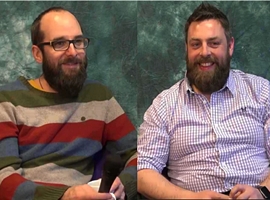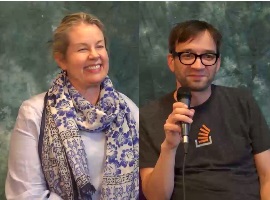InfoQ Homepage QCon Software Development Conference Content on InfoQ
-
Peter Bourgon Discusses Coding in Idiomatic Go, Building Microservices with Go-kit, and Weave Net
InfoQ sat down with Peter Bourgon, engineer at Weaveworks, and discussed how to program in idiomatic Golang, building microservices with his Go kit framework, and how Weave Net and Weave Mesh work.

-
Anne Currie Discusses Microscaling, Following in the Footsteps of Google, and the Future of Containers
InfoQ sat down with Anne Currie, co-foudner at Microscaling Systems, and discussed how container technology is currently impacting the IT industry. Topics covered included VMs vs containers, following in the footsteps of Google, and real-time scaling.

-
Richard Kasperowski on Building Great Teams
Richard Kasperowski talks about culture and technical skills, two things that matter for building great teams. He explores how technical skills and practices support agile, and shows how the core protocols can be used to establish a culture within teams that deliver great results.

-
Matt Wynne & Steve Tooke on Remote Mob Programming
Matt Wynne and Steve Tooke have been doing remote mob programming for the past few months, while building Cucumber Pro. They explain how they do it, the ups and downs, and why they think it's worth it. They talk about the tools that help them work remotely, the traits people must show on a day-to-day basis and provide specific advice on how to keep remote working sustainable in the long run.

-
Portia Tung on Executive Coaching and Habits of Effective Agile Coaches
Portia Tung talks about how executive coaching helps managers to deal with challenges and find ways to help their teams, and explores the habits of highly effective agile coaches. She provides examples from her experience of coaching agile teams and executives, and describes the benefits that agile coaches can bring.

-
Axel Fontaine on Immutable Infrastructure
Axel Fontaine, Flyway creator and Boxfuse's CEO, discusses Immutable Infrastructure and whether it's ready for the prime time. Fontaine discusses architectural and organizational concerns and explains why containers may not always be the best solution for all infrastructure problems.

-
Aaron Bedra on Security Testing as Software Engineering
Aaron Bedra talks about property-based testing, BDD-inspired security framework, and how security teams should include developers and be part of the development lifecycle.

-
Glen Ford on Cargo Cult Agile
Glen Ford discusses why imitating a culture without understanding it to become agile can be dangerous, what can happen when you copy a culture, and what organizations can do if they want to change their culture. He gives several examples on culture change and dives into what can make a culture chance successful.

-
Chris Young and Kate Gray on Winning Hearts and Minds of People
Chris Young and Kate Gray talk about applying methods used in political campaigns and the workplace to achieve goals, influence and engage people, and win their hearts and minds. They discuss how to create a vision that people can easily understand and will want to support, and how to get interaction and relevant feedback that helps deliver value.

-
Interview with Simon Ritter on Java 9
Alex Blewitt talks to Simon Ritter at QCon London 2016 about Java 9, the impact that Jigsaw will have on developers, and Java on the Raspberry Pi along with the differences between the Azul JVMs and Open JDK.

-
Aviran Mordo Discusses Technical Leadership, DevOps and Distributed Computing
Aviran Mordo discusses the skills required for technical leadership, his thoughts on DevOps, and the journey WIX has taken when implementing a microservice-based architecture. Mordo suggests that although architects may not be able to code full-time, they must remain 'hands-on', and although many new techniques, tools and frameworks are currently emerging, care must be taken with evaluation.

-
Jeffrey Fredrick on Harsh Realities and Learning
Jeffrey Fredrick discusses how human psychology can work against successful agile adoption. He explains harsh realities like accepting being wrong where people don't like to be wrong and spotting mistakes from others while not seeing your own mistakes, and explores how you can squeeze out the learning in different situations and really learn from mistakes.
